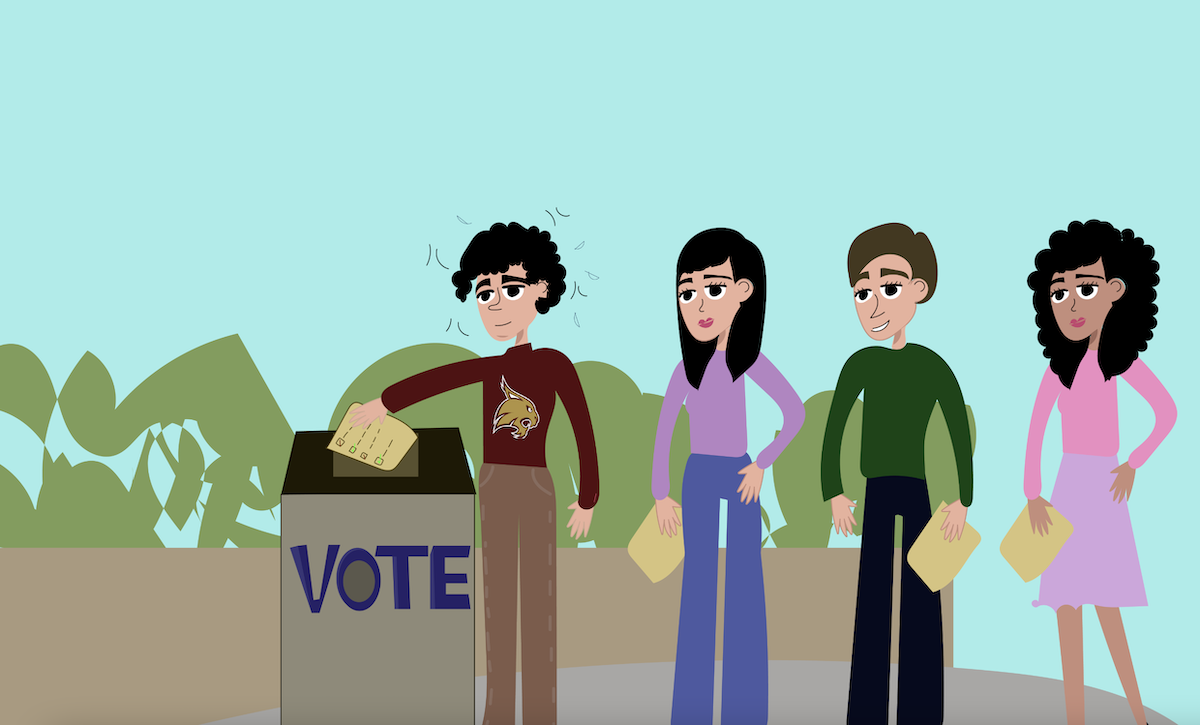Residents of Marneuli, mostly ethnic Azerbaijani, say local authorities are intimidating them
2024 Parliamentary Election in Marneuli
School staff in Marneuli, Georgia, which is mostly composed of Azerbaijanis, are being forced to attend pre-election campaign events for the ruling Georgian Dream party. Local residents told Caucasian Knot reporters that authorities are threatening to fire employees who support opposition candidates.
The opposition in Georgia has repeatedly claimed that employees of state institutions and security forces are being pressured to attend ruling party events and encouraged to vote for its candidates. Specifically, Londa Toloraia, a representative of the “My Voice” monitoring mission, reported that observers have documented 1,641 cases of voter bribery and 1,644 instances of voter coercion.
Many local and international experts believe that “Georgian Dream” is focusing on demonizing the opposition and exploiting administrative resources. Meanwhile, the opposition has made Georgia’s European choice its main slogan.
Local residents have encountered the use of administrative resources
A mathematics teacher at one of the schools in Marneuli said that teachers were required to attend a pre-election event for the Georgian Dream.

In a recent statement to the Caucasian Knot, a female teacher from a local school described how all educators were ordered to gather at the mayor’s office to participate in a meeting with a representative from the ruling party, Georgian Dream. “There were cameras and the press present, and we were broadcast on television. We’ve never been summoned like this for meetings with opposition parties,” she explained. Her colleagues from other schools in the region have reported similar experiences, noting that they are only called to meet with Georgian Dream, and no other party. She requested anonymity for fear of being identified and losing her job.
Another resident of Marneuli, 45-year-old Karaman, recounted experiencing pressure from municipal officials. “City employees approached me and warned that they were aware of my intentions to vote for the opposition. I told them outright that I would do what I believed was right. They then threatened to fire me from my workshop, even though it’s a private business. I’m not afraid—I’m willing to suffer for my principles,” he told the Caucasian Knot.
Karaman noted that doing business in Marneuli has not become easier since Georgian Dream came to power. “Yes, there was police oversight before, and enforcement of the law was lax. But now, racketeers are operating in the area, and every entrepreneur is forced to pay protection fees. The police are taking no action. My income is suffering because of this; essentially, they’re taking money out of my pocket through my employer,” he explained.
In Marneuli’s Center, campaign materials from both the ruling party and the opposition are on display.
In Marneuli, the pre-election atmosphere is marked by campaign materials from both the ruling party and the opposition. Along the central street, Rustaveli Str., numerous banners from both sides hang across the road. Store owners have displayed posters in their windows for the parties they support.
While posters for Georgian Dream dominate the scene, signs for opposition coalitions, including Strong Georgia, are also visible, reported a correspondent for the Caucasian Knot.
Parliament Chairman Shalva Papuashvili recently criticized the opposition’s campaign as lackluster. “They aren’t campaigning at all. Ask anyone involved in the electoral process—there’s no sign of the opposition in the regions; they lack any substantial campaign,” he asserted.
Locals air grievances about high prices and poor road conditions.
Residents of the Marneuli district, predominantly ethnic Azerbaijanis, expressed their intentions to vote in the upcoming elections. It’s important to note that this feedback is not representative of the region but reflects the views of those interviewed.
One 30-year-old resident, Azar, shared his plans to vote for Georgian Dream, stating, “There’s some stability under them, and there’s none of these LGBTQs.”
Everything has become so expensive; my salary isn’t enough.

Azar identified rising prices as his biggest concern. “Everything has become so expensive; my salary isn’t enough, even though I seem to earn more than most of my peers. If I weren’t married and didn’t have children, I think I could manage on my own. But we traditionally marry young, often before turning 20, so I have to support both my wife and myself,” he explained.
Irina, a pensioner of Russian ethnicity, also plans to vote for Georgian Dream. When asked how she would feel if the European Union revoked its visa-free regime with Georgia, she replied that it would be a positive development. “Let them close it! Russia is nearby! It’s open to us!” she said.
She expressed skepticism about the International Criminal Court’s 2022 ruling, which recognized Russia’s aggression against Georgia. “Russia never attacks anyone. We share a faith with Georgia; we’ve always been friends,” the pensioner asserted.
On August 8, 2008, Russia intervened in the armed conflict between Georgia and South Ossetia, later recognizing the independence of both South Ossetia and Abkhazia. Following this, the Georgian parliament voted to sever diplomatic ties with Russia. Since then, Georgia has regarded Abkhazia and South Ossetia as territories occupied by Russia, according to a Caucasian Knot report on the “Five-Day War.”
Shota, a 45-year-old unemployed lawyer, is also planning to vote for Georgian Dream. “Right now, the most important thing is to avoid war and maintain peace. Only Georgian Dream can ensure that,” he told a correspondent.
Shota expressed indifference toward Europe’s reaction to the controversial foreign agents law. “Of course, there’s been a lot of talk on TV about how bad this law is, but I don’t see anything alarming about it. What’s wrong with NGOs disclosing their income and expenses? It’s not a secret. I haven’t worked with NGOs myself, but I know they’ve done a lot of good for Marneuli. I appreciate that, but some NGOs get involved in politics, and that’s unacceptable,” he said.
On May 14, the Georgian parliament passed the “Foreign Influence Transparency” law amid widespread protests. The law, which opponents label the “Russian law,” came into effect on June 3, posing a threat to Georgia’s aspirations to ascend into the EU, according to a Caucasian Knot report on the foreign agents law.
Three men standing outside a store on Rustaveli Street in Marneuli told a correspondent that they would vote for Georgian Dream, adding that if Europe revoked the visa-free regime in response, “it would only be better.”

“Why do we even need this visa-free regime? The youth have all left Marneuli! There are no jobs, no prospects; they don’t stick around. If they revoke the visa-free travel now, they might come back home,” said 53-year-old Ali.
“They’re not leaving to work or study. It’s easier for them to find drugs there and chase after LGBTQs,” added 35-year-old Khusey. “And Russia is always nearby; we go there, but there’s no point in going to Europe,” said 55-year-old Mutalib.
When asked if they fear Russian aggression against Georgia, all three shook their heads. “No, we’re not afraid. Russia won’t go to war… In 2008, [Georgian President Mikheil] Saakashvili provoked the conflict; he kept saying the Georgian army was the strongest,” Khusey explained.
In response to a question about the problems they see in Marneuli, Ali pointed to a cracked sidewalk. “This is our main issue—roads in Marneuli aren’t repaired, and it’s even worse in the villages. And food prices are high. We’ve caught up to the EU in terms of prices. I was in Russia last week; they’re in the middle of a war, but prices are three times lower than ours,” he said.
The men expressed the belief that life has improved since Georgian Dream came to power in 2012. “Before, we couldn’t open a shop—we were afraid the tax authorities would show up or find some other violations. We feared being stopped by police on the road and getting fined. Now it’s much freer,” Ali noted.
The current government is managing the country worse and worse.
In contrast, English teacher Iya stated she would vote for the opposition. “The current government is managing the country worse and worse. Prices have skyrocketed, and there are fewer opportunities to earn a decent living. On top of that, our relations with Europe have soured. We had one hope: that our youth could study in Europe, make work contacts, and not be dependent on the government. But the current authorities have done everything to shatter that hope. And let’s not even talk about relations with Russia—rather than actively supporting Ukraine, the government is making some sort of agreements with Russia. That’s very dangerous,” she told a correspondent from the Caucasian Knot.
It’s worth noting that parliamentary elections in Georgia are scheduled for October 26. The Central Election Commission has received lists from 19 parties and coalitions. The ruling party, Georgian Dream, has submitted a list of 170 candidates, aiming for a “supermajority” in the elections.
The elections will feature several notable changes and innovations due to amendments to the electoral code, according to a Caucasian Knot report on the parliamentary elections in Georgia. The outlet is publishing materials about the election preparations on its “Georgia Elections 2024” page.
2024 Parliamentary Election in Marneuli




















